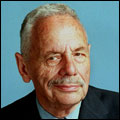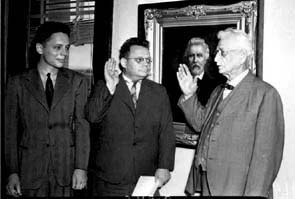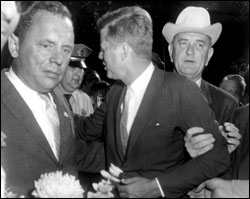Maury Maverick, Jr., Prominent San Antonio Liberal Voice Dies At 82
by Adolfo Alvarez
Texana News Writer
 Maury Maverick Jr., scion of a prominent San Antonio family who made his own mark as a liberal
lawyer, legislator and newspaper columnist, died Tuesday morning. Maverick was 82.
Maury Maverick Jr., scion of a prominent San Antonio family who made his own mark as a liberal
lawyer, legislator and newspaper columnist, died Tuesday morning. Maverick was 82.
In recent years, Maverick wrote weekly columns in the San Antonio Express News, and performed
legal work for liberal causes. However, throughout his long life, Maverick figured prominetly in
Texas politics and progressive Democrat causes.
A U.S. Marine Corps veteran during World War II, Maverick served in the Texas House of
Representatives from 1950 to 1956, one of a
handful of legislators who took a stand against rampant Red-baiting and discriminatory laws in the darkest
days of the Communist-hunting McCarthy era.
As a lawyer, Maverick, Jr. scored several important civil rights victories in the courts, including the
U.S. Supreme Court. Friend and former legislative colleague Aaron "Babe"
Schwartz once called Maverick "one of the last of the red-hot liberals."
Maverick wore his famous name like a comfortable, well-loved shirt. In the weekly column he wrote as a
freelancer for the San Antonio Express-News, he frequently mentioned members of his prominent family tree.
Before the American Revolution, a 17-year-old apprentice named Samuel Maverick was among those killed by
British redcoats in the Boston Massacre. In 1836, another Samuel Augustus Maverick Maury Maverick Jr.'s
great-grandfather signed the Texas Declaration of Independence.

The Maverick political family - Maverick, Sr. is sworn in by his father as San Antonio mayor, as Maverick, Jr.
looks on
One of Texas' largest
landowners, Sanual Augustus Maverick was an indifferent rancher
who, contrary to custom, neglected to brand his longhorn cattle.
After stumbling across an unmarked animal, cowboys would say, "That's a maverick." Soon, the label extended
to human nonconformists as well.
Maverick's father, Maury Maverick Sr., served two terms from 1935 to 1939 in the U.S. House of
Representatives as a liberal New Deal Democrat. The as-yet unelected, but ambitious Lyndon Johnson
led Maverick's 1935 campaign for Congress. Johnson biographer Robert Caro includes much about Maverick, Sr
in his biography on LBJ - The Years of Lyndon Johnson - The Path To Power.
Later, as mayor of San Antonio, Maverick, Sr. approved a permit for a
Communist Party meeting at Municipal Auditorium. The meeting sparked a riot, nearly got him
lynched, and ruined his political career.
A 1938 graduate of Texas Military Institute, Maury Maverick Jr. earned his bachelor's degree in economics
from the University of Texas in 1942. During World War II, he served in the Marines' quartermasters corps
and saw some combat in the South Pacific. He earned his law degree from St. Mary's University in 1949.

When John F. Kennedy asked to exit the Alamo through the back door to avoid passing through a large crowd,
Maverick (left) reportedly replied 'There's no back door at the Alamo. That's why we had so many
dead heroes.'
As a young representative in the Texas House, Maverick and his fellow liberals helped kill a bill that
would have imposed the death penalty on convicted Communists. In an interview in 1999, Maverick said
bigots and racists in Texas used the "Red Scare" to "bust the unions, bust blacks, bust Mexican
Americans and intimidate schoolteachers and librarians."
"It was just cruel beyond words the way they were kicking people around," said Maverick, who broke out
in hives while serving in the Legislature. "I was constantly on edge for six years. To this day, I
still haven't gotten over it."
Disgusted and frustrated with his fellow lawmakers, Maverick quit politics and dove into his law
practice, focusing on civil rights and civil liberties cases. In 1960, however, the U.S. Senate
seat that Lyndon B. Johnson gave up for the vice presidency lured Maverick back into politics
along with 70 other Democratic contenders. Known as the "71 in '60" group, Maverick later said
he and the late Henry B. Gonzalez another San Antonian who later served 37 years in the U.S.
House of Representatives split the liberal vote and ultimately canceled each other out. The
seat was won by Republican John Tower.
Henry B. Gonzalez and Maury Maverick didn't speak to each other for 20 years.
"One of us should have gotten out of the race," Maverick later recalled. "Probably me."
Maverick scored his first big legal victory in 1954 after an appellate court in Austin threw out a
law that prohibited professional boxing matches between blacks and whites. Maverick made a successful
end run around the prohibition: Instead of arguing the law was unfair, he claimed it denied his client,
boxer I.H. "Sporty" Harvey, the chance to make a living.
Ten years later, Maverick won another case he took all the way to the U.S. Supreme Court. His client,
John W. Stanford Jr., a San Antonio bookseller, had been arrested after authorities seized
supposedly seditious papers from his home. The evidence included works by Karl Marx, Jean Paul
Sartre, Pope John XXIII and a legal opinion penned by Supreme Court Justice Hugo Black.
Black's fellow jurists got a kick out of that while Maverick presented his case before the panel.
"I saw William O. Douglas nudge Black in the ribs," Maverick later recalled. "But Black
wasn't laughing."
While working for the American Civil Liberties Union, Maverick also defended Madalyn Murray O'Hair, the
world-famous atheist who was later murdered with her son and daughter in 1995. When
Maverick showed up in jail to defend her, O'Hair declared: "Thank God, the ACLU is here!"
In between his high-profile cases, Maverick also defended a steady stream of conscientious objectors,
draft dodgers and others during the Vietnam War.
Maverick married artist Julia Orynski in 1966. The couple, who lived in adjoining, slightly run-down
bungalows in San Antonio's Mahncke Park area, had no children. Maverick, who was fond of purple
martins, often picked up stray animals during his once-daily walks in his neighborhood. He liked
to bunk with his pets and worked in a cluttered office stuffed with filing cabinets, out-of-date
law journals and water-stained encyclopedias.
Although Maverick made a national name for himself with his civil rights and civil liberties cases,
he never made much money at it. Over time, he gradually eased out of his law practice to
devote full time to his newspaper column and other writing. The red-hot liberal, however, never
cooled and he never shied away from unpopular viewpoints.
Maverick's pro-Palestine position, for example, subsequently alienated most of his Jewish friends.
The American Bar Association in 1991 honored
Maverick with the prestigious John Minor Wisdom Public Interest and Professional Award
For his handling of more than 300 pro bono cases.
Original Book Review: Readers also found our review of another Texas iconoclast,
prominent Athiest Madalyn Murray O'Hair intersting - The Athiest - Madalyn
Murray O'Hair